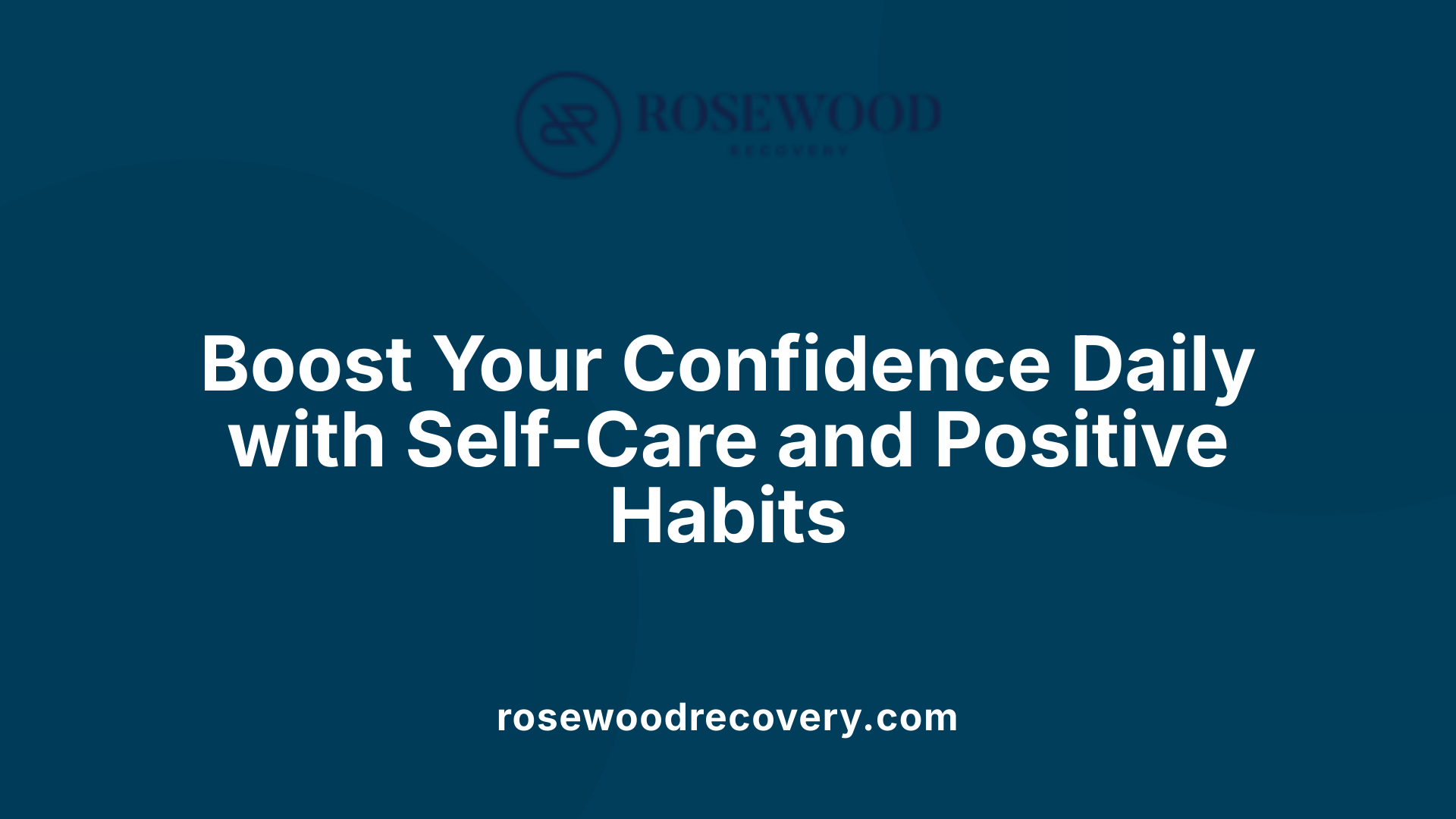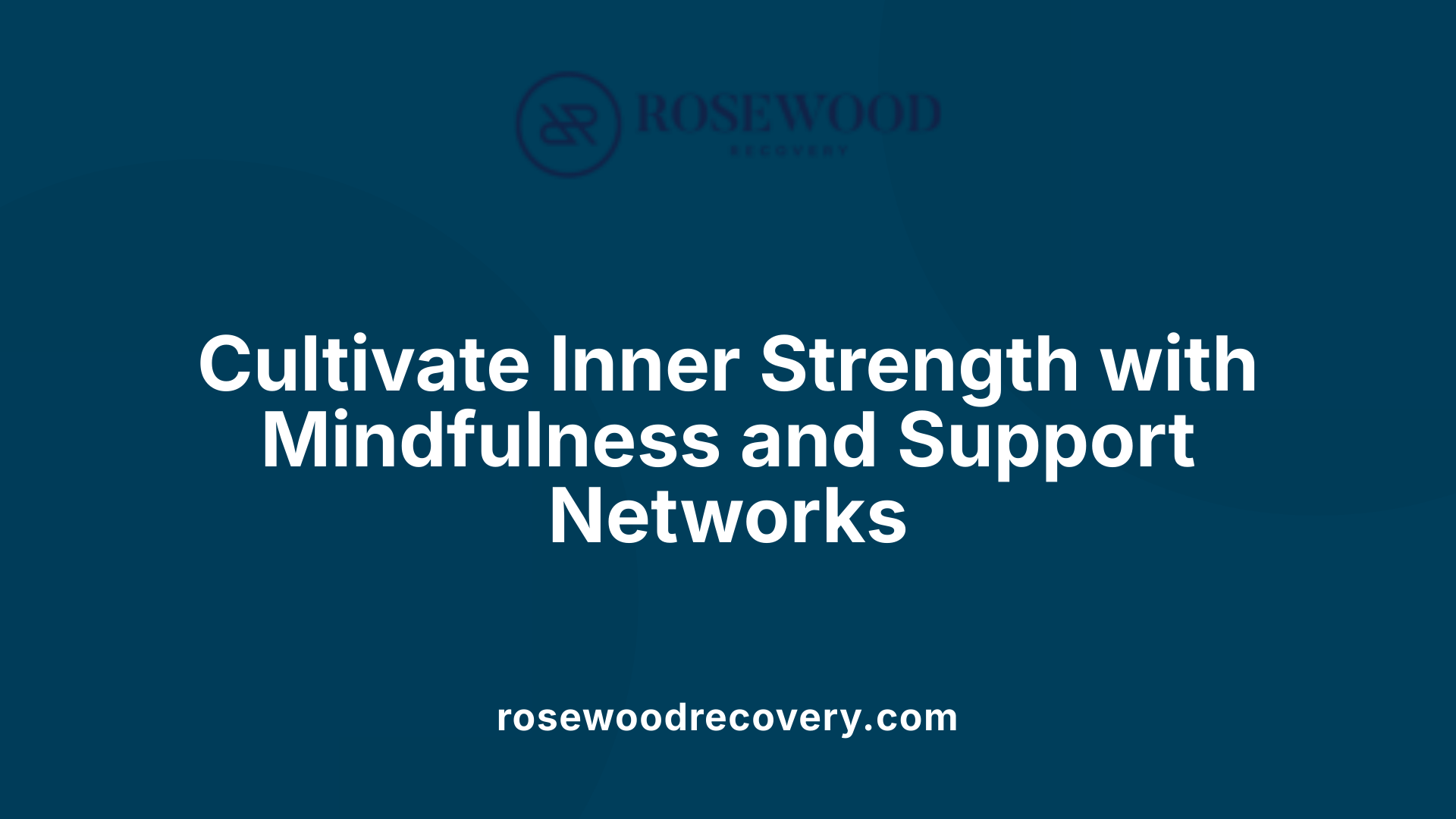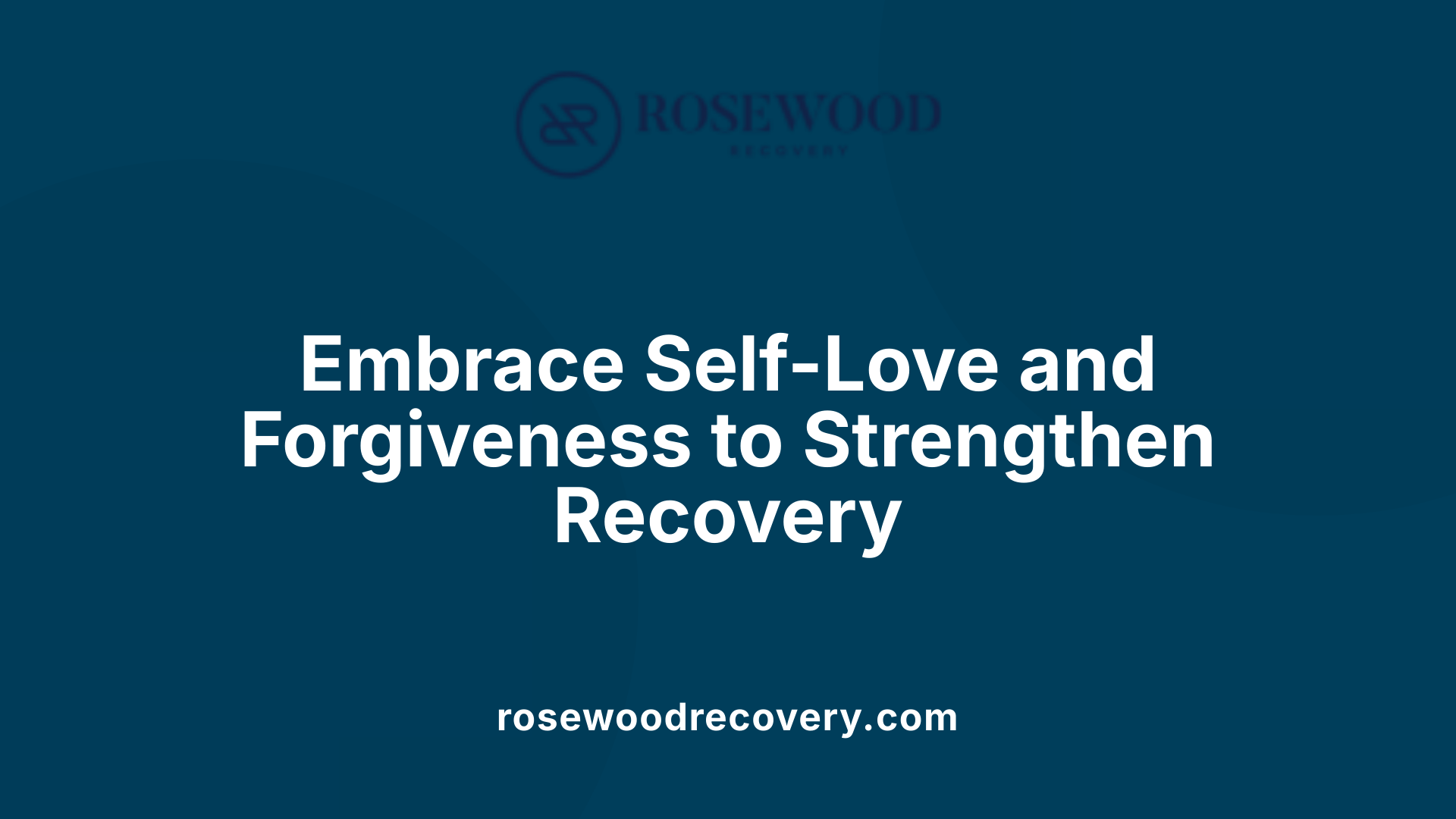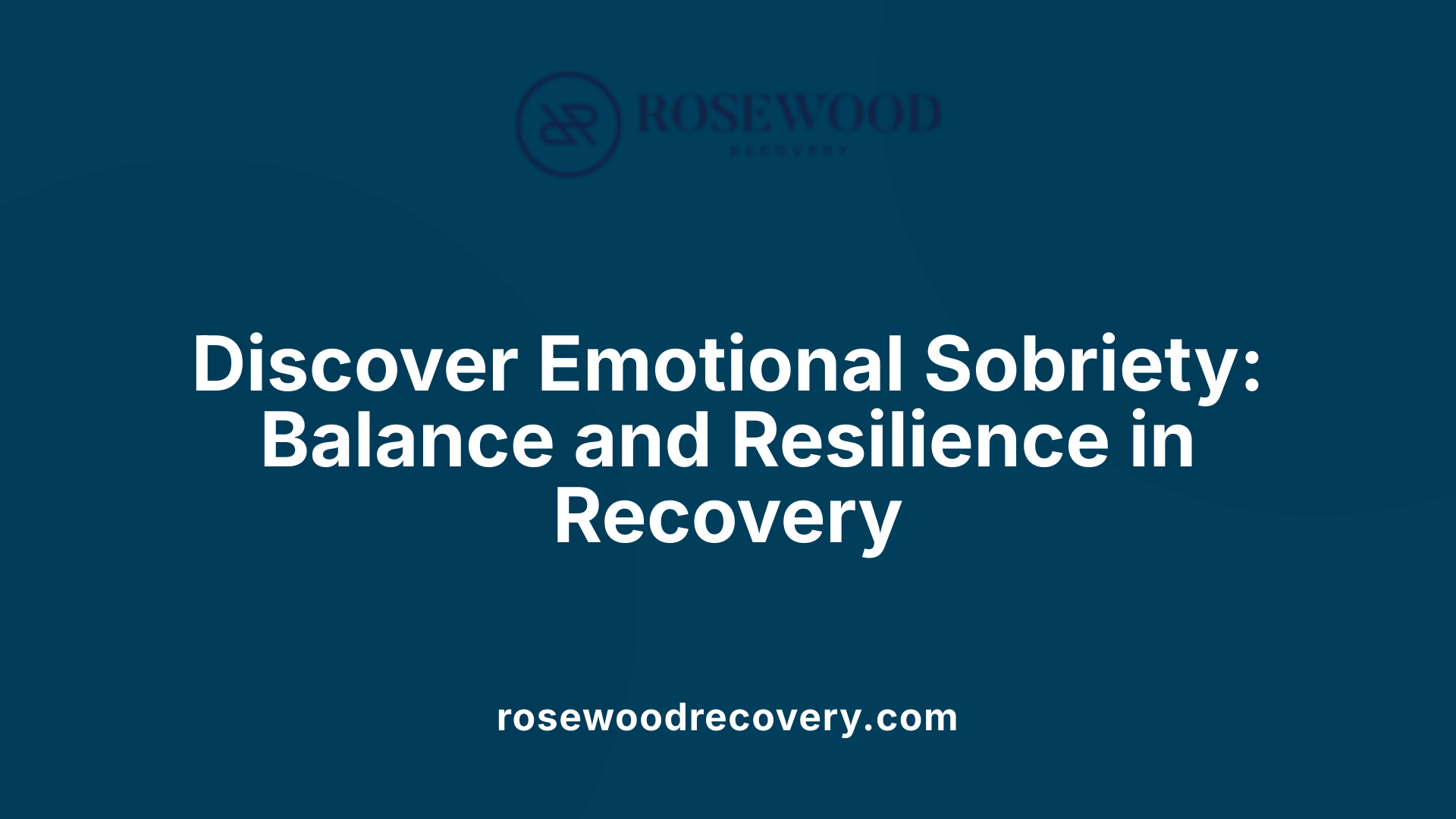Understanding the Foundation of Emotional Confidence in Recovery
Building emotional confidence is a crucial step in overcoming addiction and maintaining long-term sobriety. It involves developing resilience, self-esteem, and emotional sobriety, which work together to foster a balanced mental state capable of handling life's challenges without reliance on substances. This article explores strategies to enhance emotional confidence, the importance of self-esteem, and practical techniques for cultivating emotional resilience throughout recovery.
The Interplay of Self-Esteem and Addiction Recovery
What are the 3 C's of recovery?
The 3 C's of addiction recovery are often cited as 'Crisis,' 'Control,' and 'Choice.' These concepts emphasize the initial recognition of addiction as a crisis, which is essential for seeking help. Gaining control involves developing the ability to manage substance use, often through therapy and support systems. The final component, choice, highlights the importance of making conscious, deliberate decisions to pursue sobriety.
Some recovery approaches also interpret the 3 C's differently, viewing them as 'Courage,' 'Clarity,' and 'Confidence.' This perspective encourages individuals to develop inner strength and mental clarity, which are crucial in maintaining long-term sobriety.
How can I improve my self-confidence in recovery?
Building self-confidence is vital in the journey of recovery. Practical strategies include setting small, manageable goals that foster a sense of achievement. Engaging in self-care activities such as mindfulness meditation, positive affirmations, and regular exercise helps improve mood and self-view.
Having a strong support network of friends, family, or peer groups provides emotional reinforcement. Working with therapists, especially through cognitive-behavioral therapy (CBT), can help change negative thought patterns, replacing doubts and fears with empowering beliefs.
How to become emotionally vulnerable in recovery?
Emotional vulnerability is about opening up and expressing feelings honestly. This process often begins gradually through journaling, which helps identify and process emotions.
Trusting your support network—whether friends, family, or counselors—is essential for sharing difficult feelings. Practicing self-compassion encourages acceptance of vulnerabilities without judgment.
Sharing your emotional journey fosters deeper connections and personal growth, enabling you to handle life's challenges more resiliently. It also supports emotional sobriety, which involves maintaining balanced emotions amidst recovery.
What are the four C's in recovery?
The four C's refer to Craving, Compulsion, Control, and Consequences. Craving is the intense desire to use substances; it often triggers compulsive behaviors despite negative outcomes.
Control indicates the ability or inability to regulate substance use, often a central focus in early recovery stages.
Consequences involve the negative effects of substance abuse, such as health issues, relationship problems, and legal troubles.
Managing these elements effectively through therapy and personal strategies helps minimize relapse risk and fosters emotional stability.
Why is self-esteem critical during recovery?
Self-esteem plays a crucial role in sustaining recovery. High self-esteem boosts confidence, encourages self-care, and enhances resilience against emotional setbacks.
When individuals believe in their worth and capabilities, they are more likely to resist relapse triggers and cope proactively with stress.
Conversely, low self-esteem often correlates with negative thoughts, self-blame, and fear of failure, which can lead to relapse and mental health difficulties.
Research, including studies from the University of Texas’ Mental Health and Counseling center, underscores that improving self-esteem is associated with better recovery outcomes.
Strategies for Rebuilding Self-Esteem
Rebuilding self-esteem involves multiple approaches. Working with therapists using talk therapies like CBT helps change dysfunctional thought patterns, replacing self-criticism with positive beliefs.
Practicing self-forgiveness—letting go of guilt and accepting past mistakes—reduces shame and promotes self-worth.
Accepting compliments graciously and engaging in acts of kindness and prosocial behavior reinforce positive self-perception.
Setting realistic goals, celebrating small victories, and maintaining a routine of self-care activities such as exercise, proper nutrition, and mindfulness practices also contribute immensely.
Creating a habit of daily affirmations can gradually rewire negative self-talk into optimistic perspectives, further strengthening confidence.
The Cyclical Relationship Between Self-Esteem and Addiction
There exists a vicious cycle where low self-esteem can lead to substance abuse as a form of coping. Substance use temporarily masks feelings of insecurity and doubt, but without addressing underlying issues, self-esteem tends to deteriorate further.
In turn, addiction impairs self-worth, reinforcing negative self-perceptions and fostering a cycle that is hard to break.
Breaking this cycle involves comprehensive strategies that improve self-perception, include therapeutic support, and promote healthy lifestyle changes.
Building a Supportive Environment for Self-Confidence
Support systems are vital—whether through family, friends, or peer recovery groups—which provide emotional stability and encouragement.
Engaging in positive activities, practicing gratitude, and fostering supportive relationships help build resilience.
Additionally, learning to challenge negative core beliefs, practicing mindfulness, and incorporating self-compassion cultivate a healthier self-image.
The Role of Emotional Resilience in Sobriety
Emotional resilience is the capacity to recover from setbacks and manage stress effectively. It is essential for enduring the emotional ups and downs of recovery.
Building resilience involves developing healthy coping mechanisms like journaling, meditation, and engaging in physical activity.
Having a strong support system and viewing setbacks as opportunities for growth, rather than failures, can significantly enhance emotional strength.
Self-care routines, professional therapy, and continual personal development support this resilience.
Practical Tips for Enhancing Self-Esteem and Emotional Confidence
- Be honest with yourself about strengths and weaknesses.
- Avoid comparing yourself to others; focus on personal progress.
- Set attainable, realistic goals.
- Trust your feelings and experiences.
- Take things one day at a time.
- Engage in activities that promote physical health.
- Recognize and celebrate personal achievements.
- Surround yourself with positive, supportive people.
- Practice daily affirmations and gratitude.
- Forgive yourself for past mistakes.
Implementing these strategies consistently can help transform negative self-beliefs into positive growth, supporting long-term sobriety and emotional well-being.
| Aspect | Focus | Recommended Strategies |
|---|---|---|
| Self-esteem | Perception of worth | Therapy, self-forgiveness, positive affirmations, acts of kindness |
| Emotional resilience | Coping with setbacks | Mindfulness, healthy routines, support networks |
| Confidence | Trust in abilities | Goal-setting, celebrating achievements, positive self-talk |
| Recovery | Maintaining sobriety | Self-awareness, support groups, therapy, self-care |
Continued effort in these areas nurtures a balanced, resilient, and confident outlook, integral to lasting recovery.
Practicing Self-Care and Positive Habits to Boost Confidence

How can daily self-care routines help build self-confidence?
Engaging in daily self-care routines is essential for strengthening self-esteem, especially during addiction recovery. Activities such as taking relaxing baths, journaling, meditating, or simply enjoying time alone help soothe the mind and body. These practices foster a sense of self-worth and remind individuals of their intrinsic value.
What is the impact of physical activity and healthy eating?
Exercise releases endorphins—natural mood lifters—that help reduce feelings of depression and anxiety. It also provides visible physical changes that boost confidence. Eating healthy foods fuels the body and mind, making individuals feel more energetic and positive about themselves.
How can affirmations and mindfulness techniques support recovery?
Positive affirmations—statements that reinforce self-love and confidence—are powerful tools. Reciting affirmations daily helps reframe negative self-talk into optimistic beliefs. Mindfulness practices like meditation and deep breathing aid in staying present, managing stress, and calming inner critic voices, all vital in maintaining a resilient self-image during recovery.
Developing Emotional Resilience through Mindfulness and Support Systems

How can mindfulness and meditation techniques help build emotional resilience in recovery?
Practicing mindfulness through meditation and deep breathing exercises can be powerful tools for managing emotions and reducing anxiety. These techniques help individuals stay grounded, attentive to their feelings, and better equipped to handle cravings or stress triggers. Regular mindfulness practice fosters a state of calmness and self-awareness, which supports emotional stability and resilience.
How does building and utilizing support networks contribute to emotional resilience?
Support systems are vital in recovery, offering emotional stability and encouragement. Family, friends, and peer recovery groups provide a safe space to share feelings, celebrate progress, and seek advice during setbacks. Engaging with a support network enhances feelings of belonging and reduces feelings of isolation, making it easier to cope with challenges and bounce back from difficulties.
What can individuals learn from setbacks to cultivate growth?
Setbacks are viewed as opportunities for growth rather than failures. Recognizing that setbacks are normal parts of the recovery journey allows individuals to learn from mistakes without losing confidence. Developing a mindset that sees challenges as chances to strengthen resilience encourages perseverance. Reflecting on setbacks, practicing self-compassion, and adjusting coping strategies foster long-term emotional growth.
| Strategy | Focus Area | Benefits |
|---|---|---|
| Mindfulness exercises | Emotional regulation | Reduce anxiety, enhance self-awareness |
| Support networks | Social support | Increase resilience, decrease isolation |
| Learning from setbacks | Growth mindset | Build perseverance, reinforce confidence |
Fostering Self-Acceptance and Forgiveness

Why is self-forgiveness vital in recovery?
Self-forgiveness is a cornerstone of rebuilding self-esteem and emotional resilience. Many individuals in recovery struggle with guilt, shame, and regret over past mistakes. Learning to forgive oneself reduces feelings of unworthiness and anxiety, paving the way for healthier self-perception. When people accept their flaws and mistakes as part of their growth, it becomes easier to move forward with renewed confidence.
How can accepting compliments and kind actions boost confidence?
People with low self-esteem often find it difficult to accept praise or recognition. However, acknowledging compliments and kind gestures from others can reinforce positive self-view. Accepting such kindness shows trust in oneself and helps build self-confidence, especially during recovery. Small acts of kindness towards oneself, like celebrating personal achievements, also contribute to a more supportive self-image.
Why should avoiding comparison and practicing gratitude matter?
Constant comparison to others can diminish self-esteem, leading to feelings of inadequacy. Instead, focusing on personal progress and strengths helps cultivate a positive mindset. Practicing gratitude—acknowledging and appreciating good things in life—shifts attention from self-doubt to self-appreciation. Together, these practices promote a healthier self-view and foster emotional stability in recovery.
Understanding Emotional Sobriety and Its Benefits

What is emotional sobriety?
Emotional sobriety refers to a balanced and resilient emotional state that supports mental healing and overall well-being. Unlike physical sobriety, which focuses solely on abstaining from substances, emotional sobriety involves managing shifting emotions, reducing negative feelings, and developing inner peace.
How does emotional sobriety improve recovery?
Achieving emotional sobriety enhances the ability to handle life's challenges without turning to substances. It increases self-awareness, acceptance, and resilience, which help prevent relapse. People with emotional stability are better equipped to cope with stress, frustration, and setbacks.
Ways to develop emotional sobriety
Practicing mindfulness through meditation and journaling fosters awareness of emotions.
Building healthy coping strategies such as exercise and creative pursuits strengthens emotional resilience.
Maintaining a supportive network of friends, family, or recovery groups provides emotional reinforcement.
Learning to view setbacks as chances to grow, rather than failures, encourages perseverance.
Prioritizing self-care—such as good nutrition, sleep, and relaxation—helps maintain mental and emotional health.
Counseling and therapy can guide individuals through emotional management techniques.
Emotional sobriety is a continuous journey that enriches mental health, deepens relationships, and supports long-term recovery.
The Role of Therapy and Community Support in Building Confidence
How does therapy, such as cognitive-behavioral therapy (CBT), help in addressing low self-esteem?
Cognitive-behavioral therapy (CBT) is a highly effective approach for tackling negative thought patterns that contribute to low self-esteem. In therapy sessions, individuals learn to identify and challenge dysfunctional beliefs about themselves, replacing them with healthier, more positive perspectives. This process helps reshape self-perceptions, fostering a stronger sense of self-worth and confidence.
Why is engaging in group and peer support important for emotional confidence?
Group and peer support provide a sense of belonging and remind individuals they are not alone in their struggles. Sharing experiences with others who understand recovery creates a supportive environment for mutual encouragement. Such interactions reinforce positive self-image and inspire confidence by witnessing others’ progress.
What is the significance of honest communication in building self-esteem?
Honest communication allows individuals to express their feelings, needs, and boundaries clearly. When people communicate openly, they build trust and develop healthier relationships, which boosts self-esteem. Being truthful with oneself and others helps reduce self-doubt and promotes a more resilient self-image.
Additional insights
Incorporating therapy and community support in recovery plans gives individuals tools to develop emotional resilience. Activities like journaling and mindfulness enhance self-awareness, while support systems provide emotional reinforcement. Together, these strategies create a stable foundation for lasting confidence and sobriety.
Integrating Strategies for a Balanced Emotional Life
Combining self-care, mindfulness, and therapy
Building emotional resilience in recovery involves a holistic approach. Self-care activities such as engaging in hobbies, maintaining good nutrition, exercising regularly, and practicing relaxation techniques like meditation help nurture mental health. Therapy, especially talk therapies like cognitive-behavioral therapy (CBT), addresses negative thought patterns and promotes healthy coping strategies. Mindfulness practices such as journaling, deep breathing, and meditation help maintain emotional balance by reducing anxiety and increasing self-awareness.
Recognizing progress and celebrating successes
Acknowledging small victories boosts confidence and reinforces positive self-image. Celebrating achievements, whether it’s maintaining sobriety for a week or overcoming a personal fear, fosters motivation. Keeping a journal of progress can reveal growth over time and motivate continued effort.
Continuing personal growth beyond recovery
Recovery is an ongoing journey. Continuing self-improvement involves setting realistic goals, embracing new challenges, and seeking ongoing support from friends, family, or peer groups. Practicing gratitude and engaging in acts of kindness not only improve self-esteem but also deepen emotional stability. Remember, sustained effort and self-compassion are vital for maintaining a balanced emotional life.
Empowerment Through Emotional Confidence
Building emotional confidence is a continuous journey that requires intentional effort, self-awareness, and support. By nurturing self-esteem, practicing self-care, cultivating resilience, and embracing vulnerability, individuals in recovery can strengthen their mental and emotional foundation. This resilience not only aids in maintaining sobriety but also enhances overall well-being, fostering a fulfilling and empowered life beyond addiction.
References
- What Role Does Self-Confidence Play in Addiction Recovery?
- Boosting Self-Esteem in Addiction Recovery
- 9 Tips for Building Self Esteem During Recovery
- How to Build Confidence in Recovery
- Emotional Sobriety Plays a Key Component in Addiction Recovery
- Building Women's Confidence in Recovery | Healthy Self-Esteem
- How to Build Self-Esteem During Recovery From an Addiction




